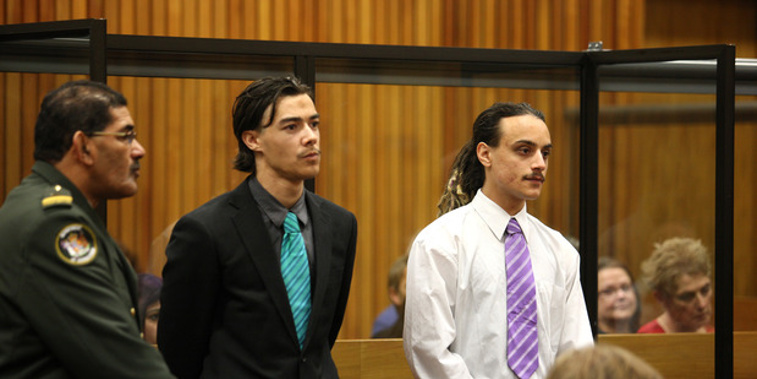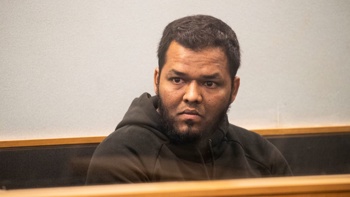
A murderer who bashed his victim with a hammer has petitioned Parliament for prisoners to be able to father a child from behind bars via artificial insemination.
The petition by Karl Teangiotau Nuku also calls for prisoners to be able to give blood and donate organs.
It has been presented to Parliament by Hutt South MP and Labour veteran Trevor Mallard, who says he did so because he believes every citizen has the right to petition Parliament and he deliberately stayed in the dark on Nuku's convictions.
Nuku is serving life in prison with a non-parole period of 18 years for the murder of Dean Browne, 38, in Wellington in 2010.
He was part of a group calling itself the Killer Clown Fiends, who fatally beat Browne in an Oriental Bay flat and then dumped his body in a New Plymouth garage.
Mikhail Pandey-Johnsonn, the leader of the group, and Nuku received life sentences with a minimum non-parole period of 18 years.
Nuku has now petitioned for legislation to be passed to give prisoners the opportunity to make organ and blood donations, and that "long-serving/life prisoners should have the opportunity to make seminal donations to registered agencies, so as to father a child".
Bronwyn Donaldson, director of offender health for Corrections, said there are no legal restrictions preventing the donation of blood, organs or sperm by prisoners.
"However, Corrections does not facilitate or support prisoners participating in [such donations] as part of their primary health care requirements...consideration would be given on a case-by-case basis by the prison director, who is required to ensure the safety of all involved."
In 2014, the Herald reported a message from Nuku was posted on a Facebook page where prison inmates are able to advertise for female pen pals, calling himself an "out-spoken kind of guy" who loves piercings and bright coloured hair.
Mallard said he had a very brief exchange with Nuku, after the prisoner had sent the petition to National MP and Hutt South candidate Chris Bishop, when Bishop was promoting his organ donation member's bill that passed in December.
"It did not get presented," Mallard said. "Whether you agree with stuff or not, it is every citizen's right to petition Parliament. And people should do it automatically as a Member of Parliament, whether they agree with it or not."
Mallard said he didn't know if Nuku wanted to have a baby with a partner, or any other motivation for the petition. He didn't have a firm view on the issues raised.
"I've never met him. I've never spoken to him. And I made a deliberate decision not to look into his background of the reason he is in prison. Because I don't think it is relevant to the right to make a petition."
Browne's parents were shocked to learn of the petition yesterday, but did not want to comment.
NZ Blood Service chief executive Sam Cliffe said mobile clinics used to be sent to prisons more than 20 years ago, but that stopped because of issues like the high level of communicable disease in the prison population, including Hepatitis.
"Things like intravenous drug use would permanently exclude you. You have to wait at least six months after receiving a tattoo before you can donate."
Janice Langlands from Organ Donation NZ said there were clear guidelines about assessing potential risk factors for donors. She was not aware of prisoners having donated organs.
"If a prisoner was in an intensive care unit with a non-survivable brain injury or expected to die, then at the time their risk would be assessed and the [transplant service] determine whether they would accept the risk or not.
"I don't recall any prisoners being in that situation, but that's not to say they wouldn't be in the future."
In Britain, an inmate was granted the right to father a child from jail in 2011 following a landmark case in which Kirk Dickson, serving life for kicking a man to death, unsuccessfully applied to have an IVF baby with his partner, who he met through a pen pal scheme.
Dickson successfully appealed to the Strasbourg human rights tribunal, which ruled blocking the couple's request was a denial of their right to become parents.
Prisoner rights have been in the spotlight recently after Corrections last month allowed convicted murderer Phillip John Smith to wear his hairpiece in prison, after Smith took the department to court.
Human rights lawyer Dr Tony Ellis, who is not representing Nuku and spoke to the Herald about the issue generally, said he didn't see any reason for prisoners not to be able to give blood, given it could be screened.
Ellis said Corrections should consider each request for sperm donation in order for prisoners could have a baby with their partner. The same case-by-case approach should be taken if any situation arose when organs could be donated.
Garth McVicar of the Sensible Sentencing Trust (SST) said he hoped any select committee that considers the petition treat the seminal donor aspect with disdain.
"I think that is appalling and shows there's no remorse. I know the family concerned, I know the hurt he has caused them."
Take your Radio, Podcasts and Music with you









